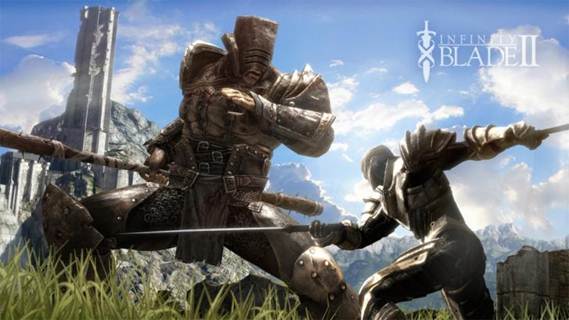Infinity Blade II
Price: $7.95
Homepage: infinitybladegame.com
System requirements
iPhone 3GS/4/4S/iPod touch 3rd/4th-gen/iPad;
iOS 3.2 or later

Not many games get the honor of stage
time in the middle of an iPhone launch. But when Tim Cook's team wanted to show
off the 4S' gaming pedigree, they made a call to Chair and asked how the sequel
to Infinity Blade was coming along.
A one-game riposte to console snobs
who don't take mobile gaming seriously, Infinity Blade brought craft and
ambition to the iOS platform. It has stunning graphics, slick gameplay and
surprisingly deep RPG elements, leavened by a dip-in piecemeal style that
perfectly suits gaming on the go.
And now, two months after wowing the
4S launch audience in demo form. Infinity Blade's sequel has burst on to the
iTunes Store. But can it improve on the beloved original? And in pushing the
limits of Apple's A5 processor in the iPhone 4S and iPad 2, has Chair made a
game that less fortunate iOS users won't be able to enjoy?
A5
haves and have-nots
Let's tackle the second question
first. Infinity Blade 11 is magnificent, with graphics that surpass even the
original game, with fast, responsive gameplay. But the iTunes Store's
specifications state that as well as A5-equipped devices, the iPad, iPhone 4
and 3GS and two generations of iPod touch can run the game too. (A spokesperson
for parent company Epic Games told us it would have preferred - but wasn't
permitted - to specify 16GB-plus models of the third-gen iPod touch, however.)
In practice, A5 devices will be at an
obvious advantage. We found the game ran like a dream on an iPad 2, but we
experienced a few crashes on our IPhone 4; while some early users have
complained of more frequent problems on the iPad 1. An update has been issued
to address these reports, and the spokesperson assured us that more are on the
way.
Infinity
- and beyond
The structure of the game is largely
the same as before: it's a series of heavily scripted one-on-one battles with
giant monsters, with a small amount of choice in the routes you take between
them. Each time you must learn your enemy's attack patterns and respond with
the correct combination of parries, blocks, counterattacks and magic spells,
activated via touchscreen gestures: swipe across the enemy to attack, to the
side of the screen to dodge, and so on.
Once you've fought enough missions,
you get to a boss. The first time you play he will probably give you a beating,
but the beauty of the game, as in the original, is that you immediately get to
play through again, with all your equipment and skills intact, and try to do
better. That's the 'Infinity' bit.
There's more depth than the first
game, with around four times the length of play: different routes will take you
to various 'Deathless' bosses. And the fights themselves require more varied
techniques: overuse the dodge, for instance, and your character will get
exhausted. And each battle offers an XP reward for mastering a particular
technique.
There are multiple fighting methods:
as well as the classic sword/shield, you can dual-wield or fight with a heavy,
two-handed weapon. Ability-enhancing gems help you to upgrade weapons.
Less
than Infinity
There are a few changes we're less
keen on, though. The premise tacks the neatness of the original, in which
getting killed caused you to come back two decades later as your own avenging
son. There's more going on plot-wise, however.
It also seems to take longer to get
going, thanks partly to a so-so opening section where you're strolling around
with super-powerful gear pinched from the God King.
Veteran gamers will know at once that
those items are going to be taken away, but you hold on to them for long enough
to level up a few times. And when you do lose the infinity Blade, the sense of
accumulation, of working your way up from rusty second-hand rubbish to godlike
armor and weapons – the essence of all RPGs - is diminished.
Finally, for some odd reason Chair
seems to have decided that everyone loved spotting and grabbing those
occasional bags of gold in the background of the first game: now there are
dozens of them. Instead of sitting back between fights and taking in the
astonishing views, you end up obsessively playing 'Where's Wallet?'

Verdict
Infinity Blade If is the perfect
sequel. The graphics are better, you're forced to approach the fights more
imaginatively, and there's more of everything. If anything can force the world
to take iOS gaming seriously, this is it.